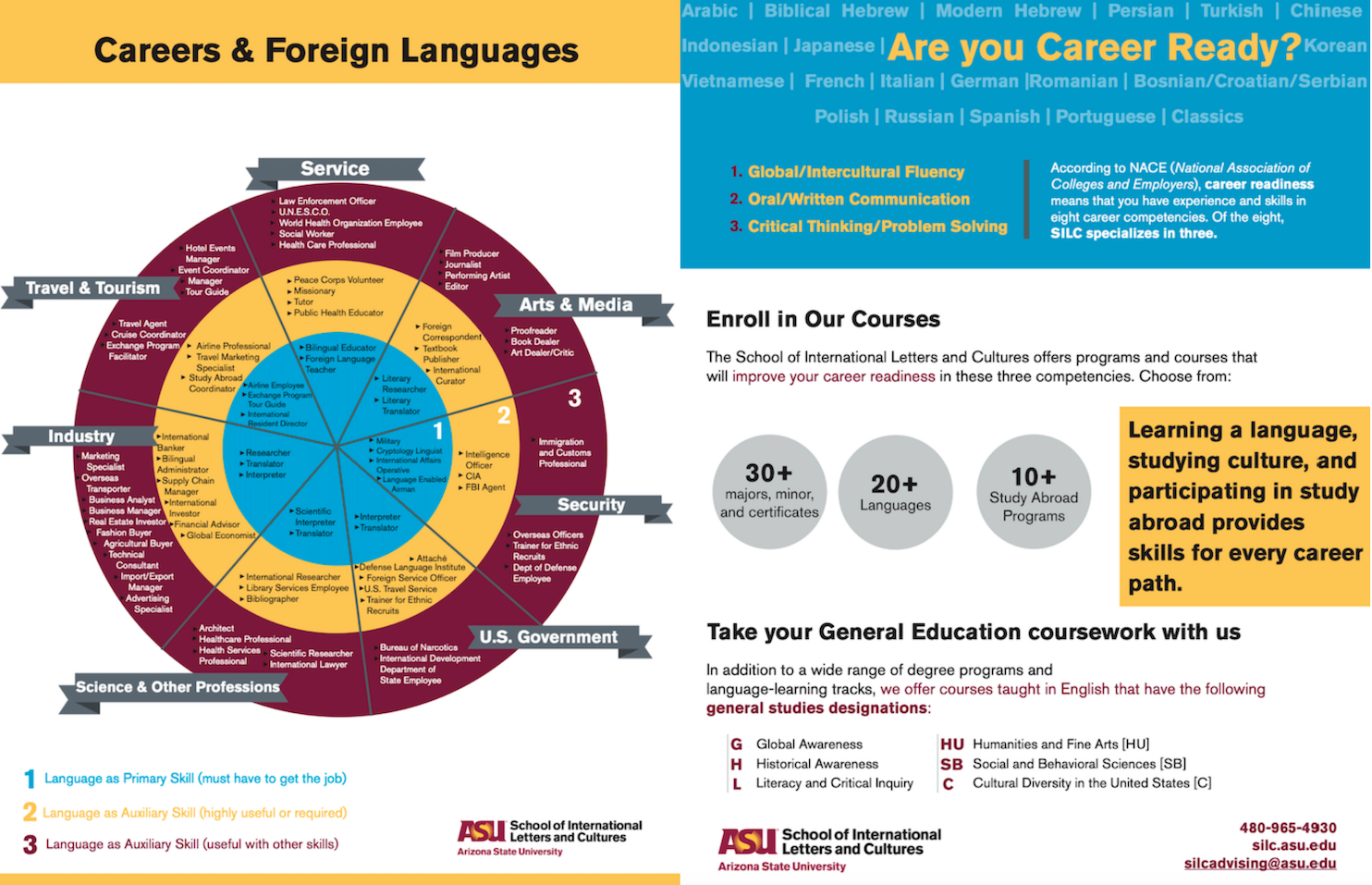Advance your career in intercultural communication
Ready to deepen your knowledge of other languages and cultures to gain a competitive advantage in the global workforce? If so, pursue your master’s or doctorate degree in the School of International Letters and Cultures at Arizona State University. Our graduate programs span Chinese, Spanish, German and Japanese to help you prepare for a career as a foreign correspondent, intercultural trainer, international representative or anything in between.
Your journey to a successful and fulfilling career in intercultural communication starts with your graduate application process. Each of our graduate programs have unique degree and admissions requirements. Please read through the program details carefully before applying so you’re thoroughly prepared to complete the application.
We can’t wait for you to join the School of International Letters and Cultures. Visit ASU graduate admissions to start your application process. If you need additional assistance, check out our frequently asked questions below or contact [email protected]
Graduate FAQs
SILC offers Master’s of Art degrees in Chinese, Japanese, French (Comparative Literature, Linguistics, Literature), German and Spanish.
Doctoral degrees are offered in East Asian Languages and Civilization (Chinese), Spanish and Comparative Culture and Language.
SILC also offers graduate certificates in Literary Translation Studies, Computer-Assisted Language Learning (CALL), and Spanish pedagogy.
Information about the SILC graduate program can be obtained online. If you have additional questions after reviewing the website, please e-mail the graduate programs student support coordinator at [email protected].
The time it will take each graduate student to complete their degree program in SILC will vary, depending on such things as whether or not a student attends classes on a full-time basis and whether or not the student is focused on a particular concentration or area of research from the start. Typically, the time to complete an MA degree is 2.5 to 3 years, while the doctoral program completion time is typically five years (if coming in with an earned master's degree). It is a Graduate College policy that master's students must complete their degrees within six consecutive years. Doctoral students have ten consecutive years from admission (or five years from candidacy).
Students must submit the general application through the university’s Graduate College online application.
- Students interested in teaching assistantships must include the TA/RA application and a copy of their resume or CV with their online application documents.
- Students applying for a Chinese section TA must submit a four-minute (approximately) video or recorded message in Chinese on a topic of their choice. Do not read your message. This is to help the committee evaluate your level, and your message should realistically reflect your spoken Chinese. Your message should be saved to a sharing platform (YouTube, Google Drive, DropBox, etc.) and a link to your message should be sent to [email protected]. This link will be shared only with the faculty reviewing your application and those determining TA offers.
Go to MyASU and check your “To Do” items listed under “MyTasks”. You can see your application status here.
No. All applications are reviewed by faculty graduate committees after each program’s deadline.
Typically, mid-January to early April. You will be given a letter on MyASU under “my application status” regarding the final decision, which comes from the Graduate College. SILC will also send an e-mail regarding admission and TA offer, if you are selected for one.
For fall 2021 admission:
|
Spanish PhD |
Jan. 15 |
|
East Asian languages and civilization PhD |
Jan. 15 |
|
Comparative culture and language PhD |
Jan. 15 |
|
Spanish (MA) |
Jan. 15 |
|
Asian languages and civilizations (Chinese) (MA) |
Jan. 15 |
|
Asian languages and civilizations (Japanese) (MA) |
Jan. 15 |
|
French comparative literature (MA) |
Not accepting |
|
French linguistics (MA) |
Not accepting |
|
French literature (MA) |
Not accepting |
|
|
Not accepting |
There are multiple funding opportunities available to current and prospective SILC graduate students.
Teaching assistant positions
The department offers funding in the form of Teaching Assistant positions to support students throughout their graduate degree program. TA positions include tuition remission, student health insurance and a stipend ($18,500 for the 2020-2021 academic year). TA positions are highly competitive and only offered to the most qualified applicants. SILC does not hire TAs who are not enrolled in one of its graduate programs.
Internships
Students may be eligible for internships through the Connected Academics initiative at ASU. Arizona State University is one of three universities nationally chosen by the Modern Language Association and the Mellon Foundation to re-imagine PhD education in the humanities for the twenty-first century. Through the MLA-Mellon Connected Academics Grant, we have designed programs that advances your career goals. Connected Academics enriches the experience of earning a doctoral degree in languages and literatures through augmented curricula, expanded para-curricular development and extensive mentoring.
As you develop your areas of expertise, you may pursue an internship opportunity within an organization outside your academic program. Internships may involve work in other disciplinary areas at ASU, partner educational institutions (K12, community college, or four-year), cultural organizations, other non-profits or industry.
Internships are designed to extend learning opportunities beyond the classroom as they allow you to gain hands-on experience in professional work environments related to your academic and career interests. An internship will provide you with a breadth and depth of experience, opportunities for you to apply principles learned in and outside the classroom, observe professionals in action, develop specific skills and better understand structures of structures of diverse work environments.
School of International Letters and Cultures fellowships and awards
Visit SILC’s scholarships and awards page for more information.
Graduate College fellowships and awards
The ASU Graduate College offers a variety of opportunities for students to fund their graduate education. Awards that SILC students have previously received include:
College of Liberal Arts and Sciences fellowships and awards
The College of Liberal Arts and Sciences is proud to offer a variety of fellowships and awards to our graduate students. These fellowships may be awarded based on merit, financial need or specific academic criteria. Unlike loans, scholarships do not have to be repaid.
Study Abroad assistantships
Each study abroad program in SILC selects one graduate teaching assistant to assist the program director. For more information about these programs, visit SILC’s study abroad page.
ASU Financial Aid office
There are a variety of other ways to pay for your graduate education. ASU’s Financial Aid office website outlines information about Loans, Grants, Federal Work Study, and other on-campus jobs.
Other sources
Many SILC graduate students receive funds from other sources like nonprofit groups and private organizations.
There are a variety of funding opportunities in varying scales and forms, and students are encouraged to use these resources as well as conduct their own research for opportunities.
The graduate experience
SPAGRAD
SPAGrad shall represent all students admitted to the graduate program in the Spanish Department of ASU. SPAGrad will provide a voice for graduate student concerns and its representatives will serve as direct liasons with the Spanish Department faculty and administrators, the Graduate College and University governance. SPAGrad will act to improve graduate education in the Spanish Department by contributing to the formation of general departmental policy and by promoting scholarly and professional development for our graduate students through the sponsorship of workshops, public discussion groups, conferences, panels, lectures, community-outreach programs and funding for travel and research.
Asian Studies Graduate Student Association (ASGSA)
The Asian Studies Graduate Student Association (ASGSA) is an inclusive graduate student organization for scholars of Asian humanities. Elected graduate student representatives in ASGSA serve all Asian Studies graduate students by conveying department and discipline-specific considerations to the Graduate College and University governance. ASGSA provides academic workshops and opportunities for professional development throughout the year and welcomes all graduate students in SILC to join these events and social mixers to encourage interdisciplinary research and conversations. ASGSA graduate students also self-publish an electronic newsletter that highlights funding opportunities, conferences and events, recent publications, and student and faculty accomplishments. It is ASGSA’s mission as a graduate student organization to develop a collaborative community of diverse scholars across all aspects of Asian Studies.
Connected Academics
We have designed programs that advance your career goals. Connected Academics enriches the experience of earning a doctoral degree in languages and literatures through augmented curricula, expanded para-curricular development, and extensive mentoring. We provide mentoring from now through graduation and beyond. your mentor will be area-specific and fitted to your interests. Your mentor will help you navigate not only course selection and scholarly research but also practical details of the graduate program.
ASU is part of the national Preparing Future Faculty (PFF) and Preparing Future Scholars (PFS) programs, which help professionalize students to a national level of excellence.
Internships may involve work in other disciplinary areas at ASU, partner educational institutions (K12, community college, or four-year), cultural organizations, other non-profits, or industry. Graduate Certificates in Humanities and Social Sciences Methodologies, in Digital Humanities, in Teaching in Higher Education, and in Computer Assisted Language Learning to offer a broader graduate education and enhance student's academic and professional profiles.
Student research
Students at SILC enjoy the resources of Arizona State University along with a supportive faculty. Studying a language opens doors, and that includes unique research opportunities. One student examined Alexander the Great's literary influence while another studied Latin American arts for sustainable solutions. See more student research by clicking below.

